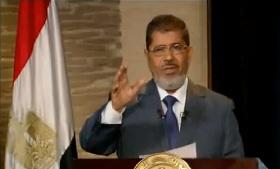Using AI to control energy for indoor agriculture
30 September 2024
Published online 25 June 2012

The narrow victory of Muslim Brotherhood candidate Mohammed Morsi over former prime minister Ahmed Shafiq, ended days of confusion after both candidates claimed to have won prior to the official announcement of the final result. Morsi secured the presidency with 51.7% of the vote in a democratic election made possible by a popular uprising 18 months ago which ended 30 years of authoritarian rule under Hosni Mubarak.
The 60-year-old president elect gained a bachelor and then masters degrees in engineering at Cairo University. He went on to complete a PhD in material science at the University of Southern California (USC) in the United States and later became an assistant professor of engineering at California State University at Northridge.
I don’t expect that his relationship with the Muslim Brotherhood will have a negative effect on academic freedoms and scientific research.
When Morsi returned to Egypt three years after receiving his PhD, he headed the material science department at Zagazig University in his hometown of Sharkia from 1985 till 2010. He has published dozens of papers on precision metal surfaces. It was soon after his return from the US that Morsi joined the Muslim Brotherhood and became a member of parliament from 2000 to 2005. He was arrested and jailed twice under Mubarak's regime, the second time during the January 2011 uprising.
Hafez Abdel Azzem, who was Morsi's fellow student in Cairo University, spoke of the president elect's academic prowess. "Morsi was an excellent student and graduated with very high grades." During that time he had no political or Islamist tendencies. He had no contact whatsoever with the Muslim Brotherhood."
Farghalli Mohamed, currently a chemical engineer at the University of California, Irvine, remembers Morsi when he was studying at USC where "he performed very well" in his graduate courses. "To my knowledge, Morsi was an excellent student researcher. He published five papers based on his PhD dissertation; three of them appeared in one of the best journals on ceramics.
"At no time did I notice any indication that his views were strong in terms of religion. Based on my interaction with him, I did not anticipate that one day Morsi would be one of the leaders of the Muslim Brotherhood," he adds. "After returning to Egypt, it seems that he did not continue his research efforts most probably as a result of him changing his interest from sciences to politics."
It is quite possible Morsi’s background in science and training in research could help in advancing sciences and technology in Egypt.
According to his election promises, Morsi plans to gradually increase science research spending to 2.5% of GDP. He will link research institutes to industry and promote the protection of intellectual property as a cornerstone to make research more attractive.
Morsi has also promised to overhaul higher education by bringing spending into line with international standards. He aims to allow for autonomous universities with improved pay for faculty members.
"My vision is for science to be the start of a renaissance in Egypt and for science research to be our weapon against the major problems that our country faces," said Morsi in a press statement.
"It is quite possible Morsi's background in science and training in research could help in advancing sciences and technology in Egypt if he becomes the president," says Mohamed. "No doubt, this will depend on reaching a state of stability in Egypt that allows ideas to emerge and scientists to work."
Bahey El-Deen Argoon, a professor of aerospace engineering at Cairo University says that having a man of science as president will have great benefits for Egypt after Mubarak's authoritarian rule - similar to the experiences of India and Malaysia. "They both succeeded in achieving scientific and economic milestones based on their overhaul of education and a focus on scientific research."
Argoon believes Morsi's education in the US in a climate of critical thought and scientific freedoms is intrinsic to a new academic culture for Egypt. But any renaissance, he says, will be dependent on Morsi's ability to cut ties with the Muslim Brotherhood and to counter the Supreme Council of Armed Forces (SCAF), which is currently heading the country. "He must set up a good and independent science advisory team,"Argoon adds, and have a strong capable science research minister.
"I don't expect that his relationship with the Muslim Brotherhood will have a negative effect on academic freedoms and scientific research," adds Argoon.
doi:10.1038/nmiddleeast.2012.90
Stay connected: